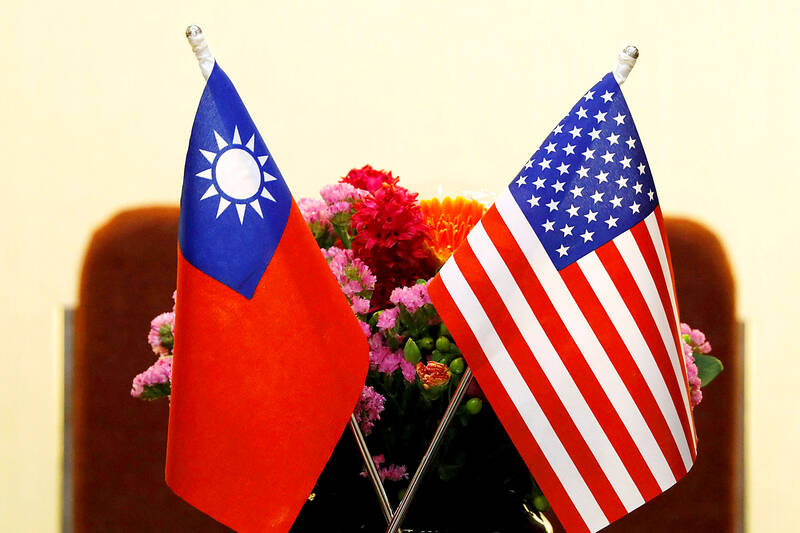Taiwanese and US officials on Friday discussed ways to expand Taiwan’s participation in UN agencies and other international forums as they held high-level talks in Washington, a US Department of State spokesperson said in a news statement.
The talks focused on evaluating efforts to endorse Taiwan’s meaningful participation in the World Health Assembly in May and the International Civil Aviation Organization Assembly last month, the statement said.
Ministry of Foreign Affairs officials and their US counterparts from the State Department agreed that they need to bolster engagement with like-minded partners in the UN bodies, as well as at UN headquarters and elsewhere, to “increase awareness of Taiwan’s positive contributions to the international community,” the statement said.

Photo: Tyrone Siu, Reuters
They also exchanged views on public health, civil aviation safety, climate change, the environment, telecommunications, intellectual property, economic cooperation and freedom of religion or belief, the statement said.
The US applauded Taiwan’s contributions to the international community and reiterated its commitment to helping Taiwan gain meaningful participation in international forums, in accordance with long-standing US policy, the statement said.
Taiwan, officially named the Republic of China, has not been a UN member since losing its seat to the People’s Republic of China in 1971, and is therefore not a member of the UN bodies.
However, Taiwan participated as an observer in the annual WHO event from 2009 to 2016, when the government, at the time led by the Chinese Nationalist Party (KMT), fostered closer ties with China.
Since President Tsai Ing-wen (蔡英文) of the Democratic Progressive Party took office in 2016, Beijing has ramped up its effort to isolate Taiwan from the international community.
Taiwan last participated in an event at the UN’s aviation safety agency in 2013.
In Taipei, the ministry thanked the US for its strong backing for Taiwan and said that such support was a testament to the solid partnership between the two sides.

Auckland rang in 2026 with a downtown fireworks display launched from New Zealand’s tallest structure, Sky Tower, making it the first major city to greet the new year at a celebration dampened by rain, while crowds in Taipei braved the elements to watch Taipei 101’s display. South Pacific countries are the first to bid farewell to 2025. Clocks struck midnight in Auckland, with a population of 1.7 million, 18 hours before the famous ball was to drop in New York’s Times Square. The five-minute display involved 3,500 fireworks launched from the 240m Sky Tower. Smaller community events were canceled across New Zealand’s

The Ministry of Foreign Affairs (MOFA) yesterday said it is closely monitoring developments in Venezuela, and would continue to cooperate with democratic allies and work together for regional and global security, stability, and prosperity. The remarks came after the US on Saturday launched a series of airstrikes in Venezuela and kidnapped Venezuelan President Nicolas Maduro, who was later flown to New York along with his wife. The pair face US charges related to drug trafficking and alleged cooperation with gangs designated as terrorist organizations. Maduro has denied the allegations. The ministry said that it is closely monitoring the political and economic situation

‘SLICING METHOD’: In the event of a blockade, the China Coast Guard would intercept Taiwanese ships while its navy would seek to deter foreign intervention China’s military drills around Taiwan this week signaled potential strategies to cut the nation off from energy supplies and foreign military assistance, a US think tank report said. The Chinese People’s Liberation Army (PLA) conducted what it called “Justice Mission 2025” exercises from Monday to Tuesday in five maritime zones and airspace around Taiwan, calling them a warning to “Taiwanese independence” forces. In a report released on Wednesday, the Institute for the Study of War said the exercises effectively simulated blocking shipping routes to major port cities, including Kaohsiung, Keelung and Hualien. Taiwan would be highly vulnerable under such a blockade, because it

UNRELENTING: China attempted cyberattacks on Taiwan’s critical infrastructure 2.63 million times per day last year, up from 1.23 million in 2023, the NSB said China’s cyberarmy has long engaged in cyberattacks against Taiwan’s critical infrastructure, employing diverse and evolving tactics, the National Security Bureau (NSB) said yesterday, adding that cyberattacks on critical energy infrastructure last year increased 10-fold compared with the previous year. The NSB yesterday released a report titled Analysis on China’s Cyber Threats to Taiwan’s Critical Infrastructure in 2025, outlining the number of cyberattacks, major tactics and hacker groups. Taiwan’s national intelligence community identified a large number of cybersecurity incidents last year, the bureau said in a statement. China’s cyberarmy last year launched an average of 2.63 million intrusion attempts per day targeting Taiwan’s critical